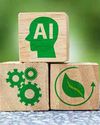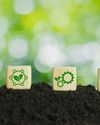
With the current increasing rate in petrochemical-based plastic production, by the year 2050, there will be about 12 billion tonnes of plastic in landfills and in the environment (PSF n.d.). It must be realized that the solution to the plastic pollution problem may never become a reality if we keep focusing only on downstream processing (collection, separation, recycling of used plastics), while at the same time investing in the petrochemical industry. For a long time now, our efforts, including government initiatives have largely focused on the management and recycling of plastic waste. Time has come for our research and development objectives to shift focus towards the synthesis of biodegradable polymers and their derivatives.
In the current scenario, the synthetic polymers are being widely used as the preferred precursors of plastics because of their low cost and high strength.
However, the inertness of these synthetic precursors makes them highly resistant to biological and chemical degradation, meaning that these tend to exist in nature for an indefinitely long time, ultimately partaking responsibility for water and soil pollution. These plastic/polymers do not decompose, instead break down into tiny fragments forming micro- and nano-plastics that can enter into the food chain.
In this worrisome situation, scientists all over the world have reported the presence of microplastics in human blood, breast milk, and placenta which can interfere with the normal cellular activities in both pregnant and lactating mothers, and consequently the infants (Muniasamy, Shruti, Pérez-Guevara, and Roy 2023).
Not to mention, the poor animals that choke to death after accidental consumption of plastics (Image 1).
Even more dangerous is the leakage of toxic-additive compounds or plastic softeners such as phthalates that can cause developmental, endocrine, and reproductive health problems.
هذه القصة مأخوذة من طبعة February 2024 من TerraGreen.
ابدأ النسخة التجريبية المجانية من Magzter GOLD لمدة 7 أيام للوصول إلى آلاف القصص المتميزة المنسقة وأكثر من 9,000 مجلة وصحيفة.
بالفعل مشترك ? تسجيل الدخول
هذه القصة مأخوذة من طبعة February 2024 من TerraGreen.
ابدأ النسخة التجريبية المجانية من Magzter GOLD لمدة 7 أيام للوصول إلى آلاف القصص المتميزة المنسقة وأكثر من 9,000 مجلة وصحيفة.
بالفعل مشترك? تسجيل الدخول

IBM's State of Sustainability Readiness Report 2024 Shows India is a Leader in Al-Driven Sustainability Initiatives
Business leaders in India see the benefits of investing in IT for sustainability, with 98 per cent planning to increase investments in IT for sustainability over the next 12 months. Around 96 per cent of Indian executives surveyed believe AI will positively influence sustainability goals.

Sustainable Low-Carbon Heat Network For Meeting Woking Town Centre's Needs in London
In this article, Dr Marianne Furtado de Nazareth highlights that sustainable low-carbon heat network at Woking Town Centre in UK, London is a wonderful project as it will allow Woking to grow and develop in a sustainable way, utilizing low-carbon heat to meet the town's needs.

The True Cost of Wildfires
More than Dollars and Cents

Staying Connected with Nature With Our Daily Routines and Lifestyle
In this article, N Kalyani discusses how disconnected we are from nature, both in terms of using natural and organic products and aligning our lives with the natural world. Given the current state of our lives, it would be valuable and intriguing to explore ways—no matter how small-to reconnect with nature through our daily routines and lifestyle.
Tiger: Iconic Symbol of Asia
When Stripes Drew a Country’s Borders

Sacred Groves Help Community in Watershed Management
Pioneering Initiative in Velhe

Role of AI in Achieving Renewable Energy Goals For an Environmentally Sustainable Future
In this article, A Jyothi Mahalingam highlights how artificial intelligence (AI) has become crucial for sustainable renewable energy (RE) generation, driven by the growing demand for electricity.

The Global Plastic Crisis
Current Situation and Strategies to Combat Plastic Pollution

GRIHA Certification
The Green Gold Standard Transforming India's Real Estate Market

Decoding the Union Budget 2025
A Green Lens on Energy, Resilience, and Sustainable Development